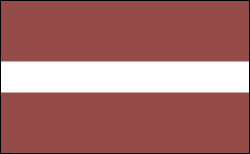- / Countries of the World
- / history
Latvia History

Index
Latvia Declares Independence and Seeks to Protect Its Ethnic Identity
Latvia was one of the most economically well-off and industrialized parts of the Soviet Union. When a coup against Soviet president Mikhail Gorbachev failed in 1991, the Baltic nations saw an opportunity to free themselves from Soviet domination and, following the actions of Lithuania and Estonia, Latvia declared its independence on Aug. 21, 1991. Most other nations quickly recognized their independence, and on Sept. 2, 1991, President Bush announced full diplomatic recognition for Latvia, Estonia, and Lithuania. The Soviet Union recognized Latvia's independence on Sept. 6, and UN membership followed on Sept. 17, 1991.
Because Latvians' ethnic identity had been quashed by foreign rulers throughout its history, the new Latvian republic set up strict citizenship laws, limiting citizenship to ethnic Latvians and to those who had lived in the region before Soviet rule in 1940. This denied about 452,000 of the country's 740,000 ethnic Russians of citizenship. But in 1998, a referendum passed easing the citizenship rules.
In June 2003, President Vike-Freiberga easily won reelection. In Dec. 2004, Aigars Kalvitis became prime minister, forming the twelfth government since Latvia's independence from Russia. The nation became a member of both the EU and NATO in 2004.
